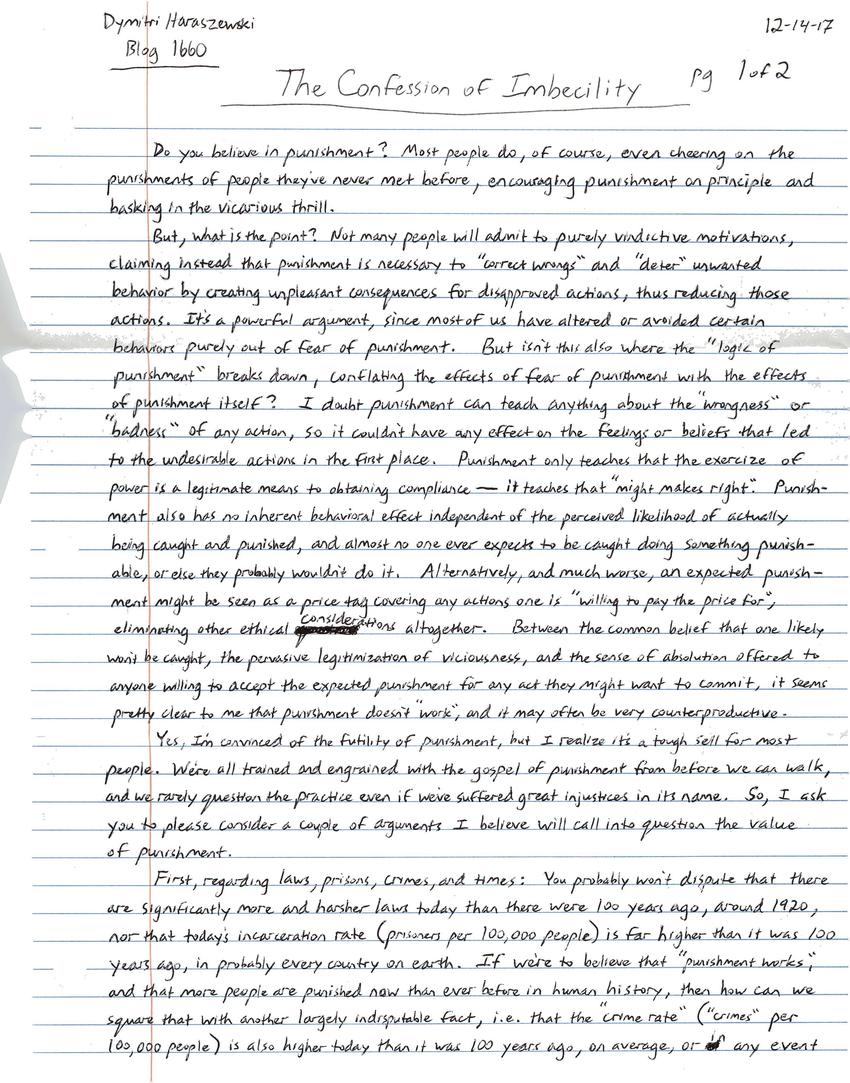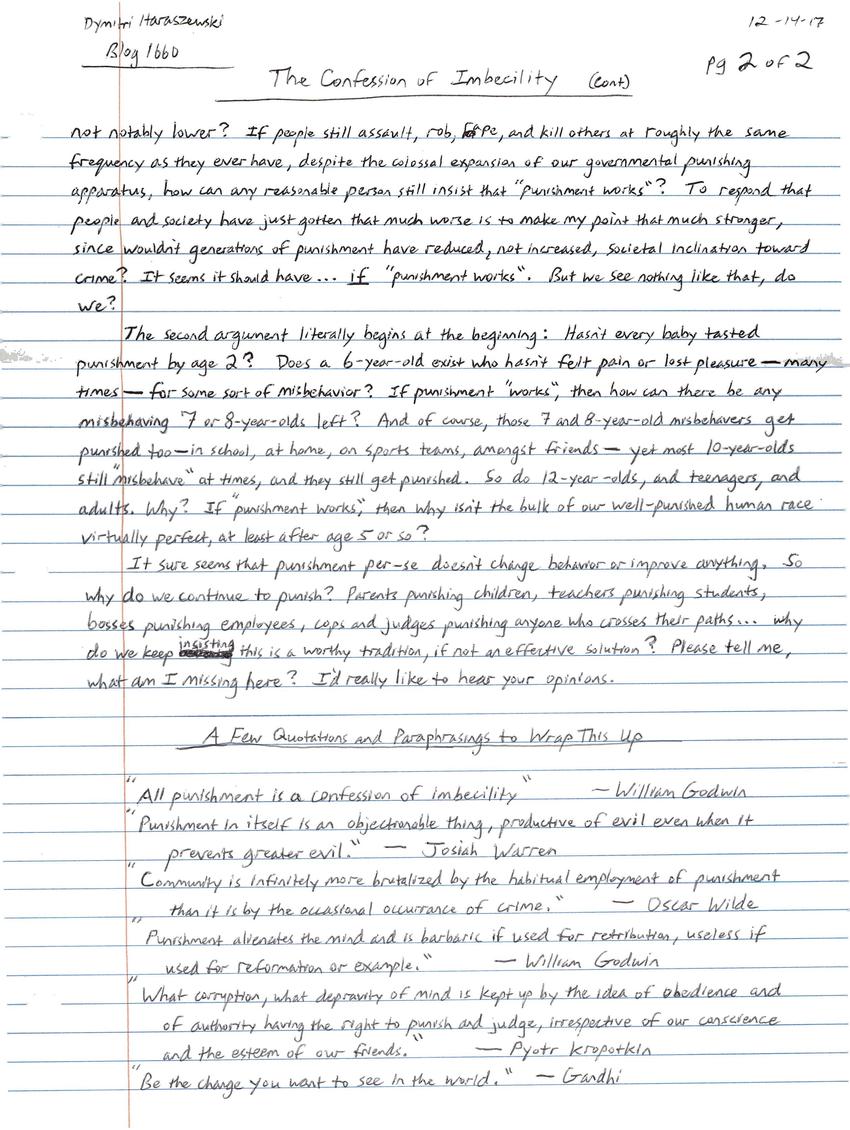
Transcription
12-14-17
The Confession of Imbecility
Do you believe in punishment? Most people do, of course, even cheering on the punishment of people they've never met before, encouraging punishment on principle and basking in the vicarious thrill.
But what is the point? Not many people will admit to purely vindictive motivations, claiming instead that punishment is necessary to "correct wrongs" and "deter unwanted behavior" by creating unpleasant consequences for disapproved actions, thus reducing those actions. It's a powerful argument since most of us have altered or avoided certain behaviors purely out of fear of punishment.
But isn't this also where the logic of punishment breaks down, conflating the effects of fear of punishment with the effects of punishment itself? I doubt punishment can teach anything about the "wrongness" or "badness" of any action, so it couldn't have any effects on the feelings or beliefs that led to the undesirable actions in the first place.
Punishment only teaches that the exercise of power is a legitimate means to obtaining compliance—it teaches "might makes right". Punishment also has no inherent behavioral effect independent of the perceived likelihood of actually being caught and punished, and almost no one ever expects to be caught doing something punishable, or else they probably wouldn't do it.
Alternatively, and much worse, an expected punishment might be seen as a price tag covering actions one is "willing to pay the price for", eliminating other ethical considerations altogether. Between the common belief that one likely won't be caught, the pervasive legitimization of viciousness and the sense of absolution offered to anyone willing to accept the expected punishment for any act that they might want to commit, it seems pretty clear to me that punishment doesn't "work", and it may often be very counterproductive.
Yes, I'm convinced of the futility of punishment, but I realize it's a tough sell for most people. We're all trained and ingrained with the gospel of punishment from before we can walk, and we rarely question the practice—even if we've suffered great injustices in its name.
So I ask you to please consider a couple of arguments I believe will call into question the value of punishment.
First, regarding laws, prisons, crimes, and times: You probably won't dispute that there are significantly more and harsher laws today than there were 100 years ago, around 1920, nor that today's incarceration rate (prisoners per 100,000 people) is far higher than it was 100 years ago, in probably every country on earth. If we're to believe that "punishment works" and that more people are punished now than ever before in human history, then how can we square that with another largely indisputable fact: that the crime rate (crimes per 100,000 people) is also higher today than it was 100 years ago on average or, in any event, not notably lower?
If people still assault, rob, rape, and kill others at roughly the same frequency as they ever have, despite the colossal expansion of our government punishing apparatus, how can any reasonable person still insist that "punishment works"? To respond that people and society have just gotten that much worse is to make my point that much stronger—since wouldn't generations of punishment have reduced, not increased, societal inclination towards crime? It seems it should have... if "punishment works". But we see nothing like that, do we?
The sound argument literally begins at the beginning: Hasn't every baby tasted punishment by age 2? Does a 6-year-old exist who hasn't felt pain or lost pleasure—many times—for some sort of misbehavior? If punishment "works", then how can there be any misbehaving 7 or 8-year-old left? And of course, those 7 or 8-year-old misbehavers get punished too—in school, at home, on sports teams, amongst friends—yet most 10-year-olds still "misbehave" at times, and they still get punished. So do 12-year-olds and teenagers and adults, Why? If "punishment works", then why isn't the bulk of our well-punished human race virtually perfect, at least after age 5 or so?
It sure seems that punishment per se doesn't change behavior or improve anything. So why do we continue to punish? Parents punishing children, teachers punishing students, bosses punishing employees, cops and judges punishing anyone who crosses their paths.
Why do we keep insisting this is a worthy tradition, if not ineffective solution? Please tell me, what am I missing here? I'd really like to hear your opinions.
A Few Quotations and Paraphrasing to Wrap This Up
"All punishment is a confession of imbecility."
—William Godwin
"Punishment in itself is an objectionable thing, productive of evil even when it prevents greater evil."
—Josiah Warren
"Community is infinitely more brutalized by the habitual employment of punishment than it is by the occasional occurrence of crime."
—Oscar Wilde
"Punishment alienates the mind and is barbaric if used for retribution, useless if used for reformation or example."
—William Godwin
"What corruption, what depravity of mind is kept up by the idea of obedience and of authority having the right to punish and judge, irrespective of our conscience and the esteem of our friends."
—Pytor Kroptokin
"Be the change you want to see in the world."
—Gandhi
Other posts by this author
|
2026 jan 14

|
2026 jan 14

|
2026 jan 14

|
2026 jan 14

|
2026 jan 14

|
2026 jan 14

|
More... |



Replies